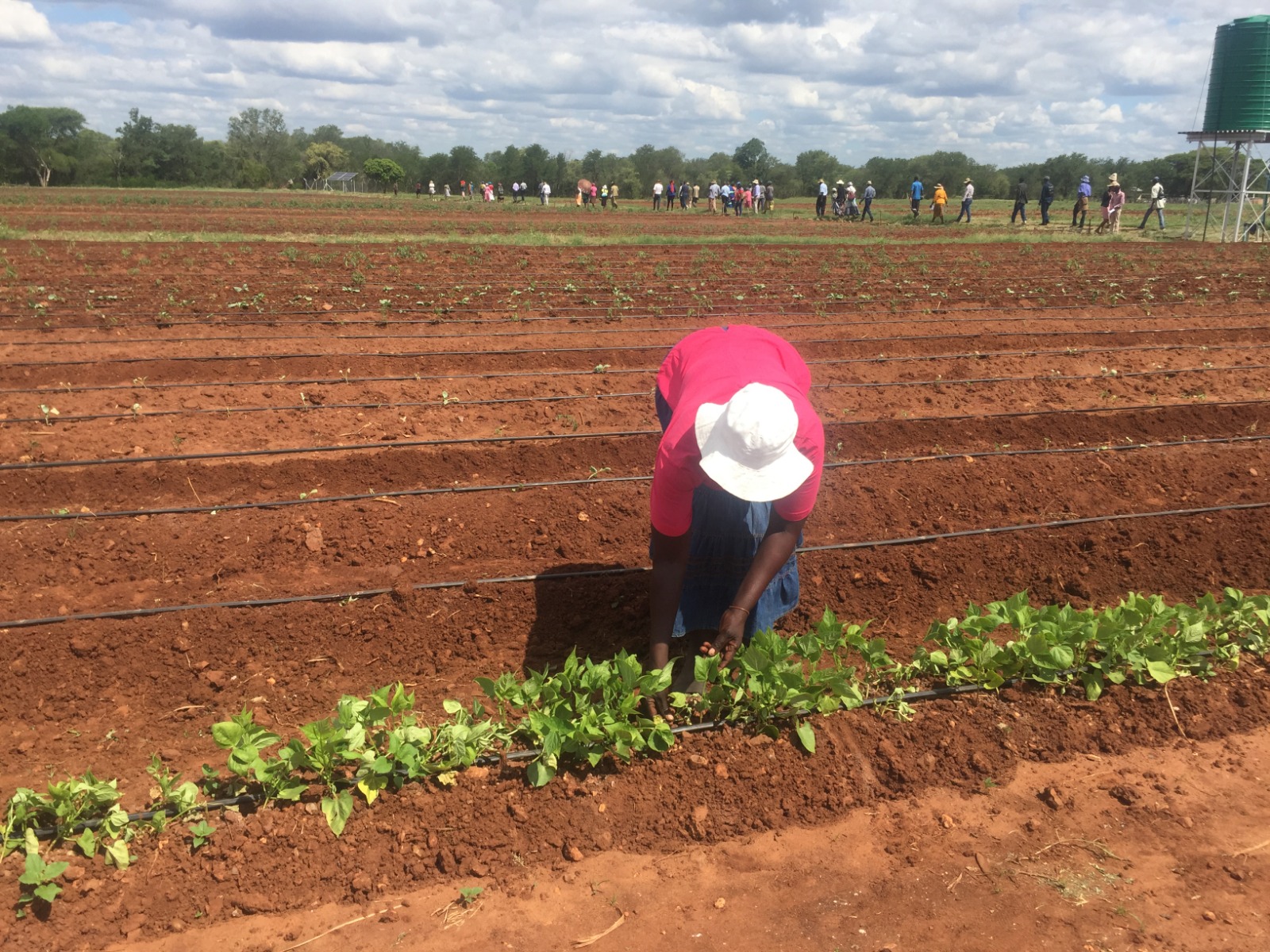Zimbabwe surmounts climate change via smart agriculture

Drip irrigation has become answer to Zimbabwe’s drought, livelihood woes
LUPANE, Zimbabwe
Khethiwe Ndlovhu is a middle-aged woman hailing from one of Zimbabwe’s hottest regions. And, despite the blazing heat in her hometown, she has made remarkable strides in her agricultural ventures thanks to smart agriculture.
Ndlovhu, 55, is living in Lupane, a district of Matabeleland North province and she is a proud woman who has funded the education of her own children single-handedly through farming under what she terms “the toughest conditions.”
For many Zimbabweans, agriculture is the mainstay of their economies, but intermittent droughts and the impact of climate change through rises in temperature and reduced rainfall have over the decades negatively affected the country’s agricultural sector as many people rely on rain-fed crop production.
Smart agriculture helps muddle through droughts
With smart agriculture, farmers of the Southern African country have been spared from the scourges of drought.
From Lupane as well, 43-year old Christopher Moyo has beaten the impacts of climate change.

Ndlovhu and Moyo are among 63 farmers gathering under the Tshongonkwe Irrigation scheme of the district, which has outsmarted climate change impacts in this part of Zimbabwe.
“With drip irrigation which I use in my farming projects since there is no water here, I have managed to send my daughter to a boarding school here,” Ndlovhu told Anadolu Agency.
The agricultural technique has enabled Ndlovhu to make sure she has crops for sale in order to sustain her daughter’s education.
Drip irrigation is a method that makes use of slim tubes to deliver water directly to the base of a plant, with the water dripping slowly to the roots.
“Next term I will be harvesting tomatoes whose proceeds I shall use to pay my daughter’s second term school fees,” Ndlovhu said.
A healing touch on lives
A father of four, Moyo has personally prevailed against climate change odds through irrigation, and in a short time, he has scaled to greater heights in terms of farming in the midst of incessant droughts in Lupane.
“I started relying on drip irrigation just last year, first with two hectares of cabbage; so I exchanged cabbages with maize when trading; I would get a five liters [1.3 gallons] of maize per each head of cabbage I sold and after trading off all my cabbages I realized I had managed to get two and half tons of maize,” Moyo told Anadolu Agency.
His life has changed for the better. “I started selling the maize for 80 Zimbabwean dollars ($5) per 20-liter tin, earning 4,800 dollars ($282) at the end.”
“After selling the maize, I have remained with one and half tons for my own consumption; the money I have obtained through drip irrigation has helped settle school fees for my children,” said Christopher.
For him, drip irrigation has kept his family going. “Without it, my family would have starved to death.”

Ozias Ncube, 40, is another resident of Lupane, who has found a breakthrough in planting cabbages using drip irrigation and then trading the product with sorghum.
“One head of cabbage is fetching me a five liters of maize or sorghum,” he said.
“I got one ton of grain this year by trading my cabbages, and I sold them to raise school fees of my children. I also use the grain to feed my chickens,” Ncube told Anadolu Agency.
The Tshongonkwe irrigation scheme was established in 1966 in Jotsholo, Lupane.
Now, 63 communal farmers have become part to the farming scheme — 22 males and 41 females, with each farmer having designated his or her own farming space.
Drip irrigation creating jobs
Thanks to solar-powered boreholes drilled for the farmers by the United Nations Development Program, the Tshongonkwe irrigation scheme has become a force to reckon with, according to villagers.
“We get vegetables from Tshongonkwe, we get beans from Tshongonkwe, we also get part-time jobs at Tshongonkwe, and it has made a difference in our lives,” Lymon Dlodlo, a male villager in Lupane, told Anadolu Agency.
Communal farmers at the Tshongonkwe irrigation scheme hailed smart agriculture for leading them into forming savings clubs.
“We now have savings clubs as farmers which help us buy things like fertilizers. As we borrow from our own savings, we pay back at an interest so that the fund keeps revolving,” said Ndlovhu.
While as many like Ndlovhu and Moyo make strides in their fight against climate change in this Southern African nation, even the government acknowledges the life changes.
“The communities here have moved from zero status to hero status because of drip irrigation that has made lives better. Lives have literally changed,” Ennety Sithole, Lupane’s District Development Coordinator, told Anadolu Agency.
Yet, for years, Zimbabwe’s remote districts like Lupane have had to bear the incessant droughts owing to the impacts of climate change. But now, with organizations like UN Development Program coming to the villagers’ rescue with solar-powered boreholes, Lupane, for instance, has embraced irrigation schemes that have cushioned the villagers against hunger and poverty.
Apart from using irrigation to fend off impacts of climate change, the villagers have also resorted to growing drought-tolerant crops like small grains which they harvest in excess, selling the surplus to the markets arranged by the UN Development Program, subsequently earning them money for self-support.
According to Ahunna Eziakonwa, regional director of UN Development Program Africa, drip irrigation is the way to go in combatting climate change.
“Transformation at the expense of the environment is not sustainable. We need to practice smart agriculture by protecting and enriching the resources which we grow and produce food with.
“Drip irrigation is one such climate smart practice, helping to deliver sufficient water to the crops and at the same time conserving the precious resource,” Eziakonwa told Anadolu Agency.







